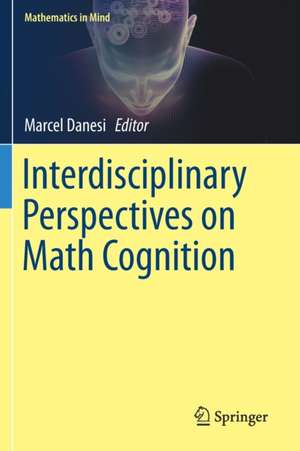Interdisciplinary Perspectives on Math Cognition: Mathematics in Mind
Editat de Marcel Danesien Limba Engleză Paperback – 25 sep 2020
| Toate formatele și edițiile | Preț | Express |
|---|---|---|
| Paperback (1) | 699.59 lei 6-8 săpt. | |
| Springer International Publishing – 25 sep 2020 | 699.59 lei 6-8 săpt. | |
| Hardback (1) | 705.99 lei 6-8 săpt. | |
| Springer International Publishing – 25 sep 2019 | 705.99 lei 6-8 săpt. |
Preț: 699.59 lei
Preț vechi: 823.05 lei
-15% Nou
Puncte Express: 1049
Preț estimativ în valută:
133.86€ • 140.14$ • 110.77£
133.86€ • 140.14$ • 110.77£
Carte tipărită la comandă
Livrare economică 05-19 aprilie
Preluare comenzi: 021 569.72.76
Specificații
ISBN-13: 9783030225391
ISBN-10: 3030225399
Pagini: 344
Ilustrații: VIII, 344 p. 105 illus., 4 illus. in color.
Dimensiuni: 155 x 235 mm
Greutate: 0.49 kg
Ediția:1st ed. 2019
Editura: Springer International Publishing
Colecția Springer
Seria Mathematics in Mind
Locul publicării:Cham, Switzerland
ISBN-10: 3030225399
Pagini: 344
Ilustrații: VIII, 344 p. 105 illus., 4 illus. in color.
Dimensiuni: 155 x 235 mm
Greutate: 0.49 kg
Ediția:1st ed. 2019
Editura: Springer International Publishing
Colecția Springer
Seria Mathematics in Mind
Locul publicării:Cham, Switzerland
Cuprins
1. From Biological Brain to Mathematical Mind: The Long-Term Evolution of Mathematical Thinking (D. Tall).- 2. Compression and Decompression in Mathematics (M. Turner).- 3. How Technology Has Changed What It Means to Think Mathematically (K. Devlin).- 4. Machine vs. Structure of Language Via Statistical Universals (K. Tanaka-Ishii).- 5. Number Work: Recovering the Original Complexity of Learning Arithmetic (B. Davis).- 6. The Body of/in Proof: An Embodied Analysis of Mathematical Reasoning (L. Edwards).- 7. Math Puzzles and Learning Devices (M. Danesi).- 8. Diagrams in Mathematics: On Visual Experience in Peirce (V. Kiryushchenko).- 9. Laws of Form, Peirce and Cantor (L. Kauffman).- 10. The Topology of Mathematics in the Mind and its Interaction with Verbal and Written Language (R.K. Logan, I.P. Oldenhoff).- 11. Mathematical Fiction as an Interdisciplinary Source for Mathematics Courses: Resources and Recommendations (F. Nuessel).- 12. Science, Magic, and the In-Between: Whence Logic (I. Semetsky).- 13. Geometric Cognition (W. Whiteley).- 14. Using Evidence to Close the Achievement Gap in Math (J. Mighton).- 15. Knowledge Building, Mathematics and Creative Thinking: An Overview on Ontario Elementary Mathematical Teaching Beyond 21st Century Skills (S. Costa).- 16. Crypto-Mathematics in Ethnography: Estimation and Approximation via Ballparks adn Eyeballing (M. Anderson).- 17. A Mathematician, A Physicist and an Engineer: The Meaning of "M" in Stem (D. Martinovic).- 18. Why a Duck? A Three-Part Essay on the Mathematics of Cognition (Y. Neuman).- 19. On Mathematical Ways of Knowing: Ramblings of a Humanistic Mathematician (G. Karaali).- 20. Epilogue: So What is Math Cognition? (M. Danesi).
Recenzii
“The book is dense with very well rounded research that provides the reader with a deep understanding of each body of research. I highly recommend this book for those interested in how math cognition works and to have new, insightful takeaways for additional research of your own making.” (Peter Olszewski, MAA Reviews, January 4, 2020)
Textul de pe ultima copertă
This is an anthology of contemporary studies from various disciplinary perspectives written by some of the world's most renowned experts in each of the areas of mathematics, neuroscience, psychology, linguistics, semiotics, education, and more. Its purpose is not to add merely to the accumulation of studies, but to show that math cognition is best approached from various disciplinary angles, with the goal of broadening the general understanding of mathematical cognition through the different theoretical threads that can be woven into an overall understanding.
This volume will be of interest to mathematicians, cognitive scientists, educators of mathematics, philosophers of mathematics, semioticians, psychologists, linguists, anthropologists, and all other kinds of scholars who are interested in the nature, origin, and development of mathematical cognition.
Caracteristici
Includes contributions from some of the world's best-known researchers and scholars in the field, edited to be comprehensible for non-experts Covers various perspectives employed to study math cognition, ranging from neuroscience to semiotics Provides a truly interdisciplinary collection of work that will be of interest to an exceptionally wide variety of readers












